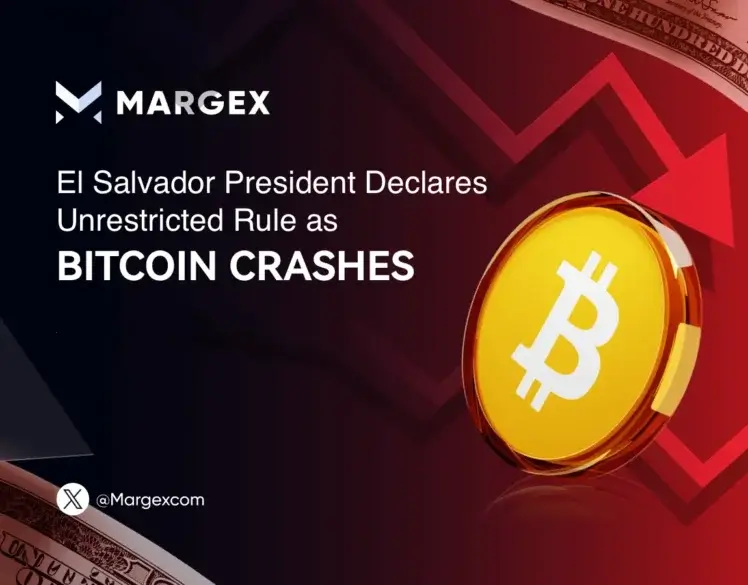El Salvador President Declares Unrestricted Rule as Bitcoin Crashes

Last week, two major developments in the financial and political worlds took place that have had a devastating impact on the Bitcoin price, pushing it more than 5% down. The first one was the monthly FOMC meeting, and the second one was related to El Salvador, the country that has adopted Bitcoin as the only official medium of exchange.
On Wednesday, the Federal Reserve chairman Powell announced the lack of intention to slash interest rates, leaving them on the same level as before. The second one is that El Salvador’s Bitcoin-loving president can now stay in power legally for as long as he wants. While these events took place in different parts of the world, they have both likely triggered the bearish market sentiment, pushing the Bitcoin price down.
El Salvador’s Bitcoin president gains unchecked power
As a result of a sweeping vote by the national assembly in El Salvador president Nayib Bukele now has an indefinite power limit. This decision was made with minimal debate, with a change of constitutional norms that previously limited the presidential term. Besides, this vote extended his future presidential terms from five to six years. The next presidential election in El Salvador will now take place in 2027. Bukele’s party fully controls the legislature, and now he will not be challenged in his ability to stay in power for as long as he desires.
Nayib Bukele has been jokingly referring to himself as the “world’s coolest dictator.” Bukele gained popularity from his draconian crackdown on local gangs when he imprisoned more than 2% of the country’s adult population, which drove a drastic decline in homicide rates. This won him wide support in El Salvador and across Latin America, while international human rights groups got worried about increasing repression, censorship, and political centralization.
This was followed by the abolishment of his presidential term limits. Opposition lawmakers have described this move as the end of Salvadorian democracy. According to human rights defenders, a famous activist was recently imprisoned in El Salvador, and many independent journalists were driven out of the country over multiple threats. Nevertheless, Bukele’s supporters insist that the president has restored order in the country, improving the local population’s safety in the streets.
El Salvador and wide Bitcoin adoption
A major part of Bukele’s high profile is Bitcoin. In September 2021, El Salvador became the first-ever nation-state that proclaimed Bitcoin its legal tender, eliminating the circulation of fiat money. Bukele launched a state-controlled crypto wallet, began to promote crypto tourism, and also proposed the creation of a “Bitcoin City” powered by geothermal energy from a local volcano.
Bukele turned into a Bitcoin maximalist, tweeting BTC price forecasts. He also began accumulating Bitcoin using national reserves. Still, as Bitcoin remains volatile, this has been impacting the experiment negatively, with public BTC adoption somewhat lagging and rapid BTC price swings hurting fiscal planning.
Now that Bukele consolidates power solely in his hands, some investors and crypto advocates are questioning whether BTC can bloom in a country with eroding political freedom, since initially, Bitcoin was created to oppose centralized power and was used by libertarians. Concerns are growing about a trend where Bitcoin is being adopted by dictators who advocate digital finance freedom but not actual political freedom and freedom of speech in their countries.
Curiously, one of the renowned Bitcoin advocates, Max Keiser, has moved to El Salvador as he became the official BTC advisor to Bukele.
| Month | Minimum Price | Average Price | Maximum Price |
|---|
Fed’s interest rate decision and Bitcoin plunging
On Wednesday, Bitcoin’s price plunged, reacting to the scheduled FOMC meeting, where the chairman of the Federal Reserve, Jerome Powell, announced that interest rates would not be cut this time. BTC started rolling down on the same day and then continued to do so during the following days.
Powell confirmed that rates would remain at the current high level for longer than was initially expected necessary to make sure inflation is kept under control. Until stronger progress is noticed in key inflation metrics, rates will remain uncut, according to Powell. This decision crushed investors’ hopes for a liquidity boost coming in the near term, and this affected the equity markets, as well as that of cryptocurrencies, which are considered to be risk assets. President Trump once again took a strong jab at chairman Powell.
The crypto market reacted with massive liquidations across crypto exchanges, which pushed the prices down heavily. Investor sentiment went bearish. Since July 30th, when the Fed decision was announced, Bitcoin has lost 5.48%, falling from $118,700 to $112,200. By now, BTC has slightly recovered, trading at $114,120 per coin.


